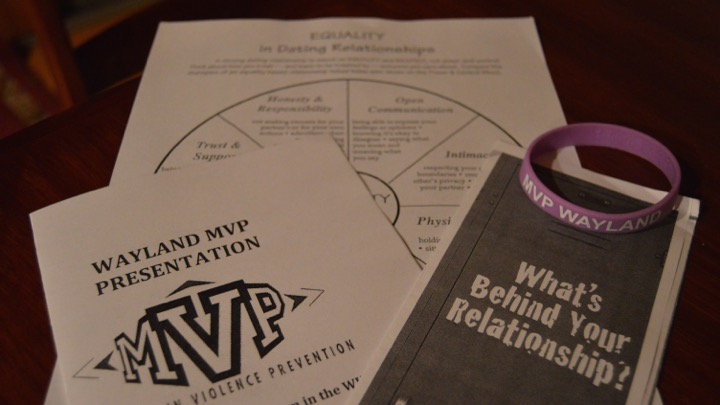Seniors lead MVP presentation for students and parents
Credit: Thomas Chan
Pictured above are materials that were available during the MVP presentation. The presentation discussed signs of abuse and how to prevent it. “I hope that we have made people more aware of what an unhealthy relationship looks like and how to strive for a healthy relationship,” club advisor Rachel Hanks said.
October 29, 2015
On Oct. 27, 10 seniors led a presentation for the Mentors in Violence Prevention program (MVP), teaching students about domestic violence and abuse. Attendance to the presentation was mandatory for student athletes participating in fall sports. The presentation featured a slideshow, two videos and speaker Jessica Teperow.
Nour Sayeh, one of the 10 leaders, opened the presentation. She stated one of the goals of the MVP program within the high school. “We want to make bystanders involved and make a change,” she said.
“Our goal was to spread awareness to our fellow students and parents about what we’re doing. We wanted to get our message out,” said senior leader Kylie Ham. “For parents, our message was to try to take the first step to talk to your children [about domestic violence]. A lot parents and students came, so I think we did a good job of achieving it.”
The MVP club aims to provide trustworthy and responsible figures for students and pass awareness about domestic violence. It also hopes to visit the middle school and bring a speaker to WHS during Winter Week.
According to the presentation slideshow, MVP hopes to “train male college and high school student athletes and other leaders to speak out against rape, battering, sexual harassment, gay bashing and all forms of sexist abuse and violence.”
The first video featured was a news segment about the murder of Yeardley Love, a college student at the University of Virginia. Love, a victim of domestic violence, was murdered by her boyfriend George Huguely.
Following the video, Jimmy Lampert led a visualization exercise in which students were to close their eyes and imagine the woman they love the most being assaulted by a man with a passive bystander present. Fellow senior Bronwyn Davies then asked the audience how they felt about the experience, to which those who raised their hands replied that they felt helpless and wished the bystander would do something.
The presentation also mentioned the prevalence of sexual assault in college. One of their slides featured the following quote by President Obama: “It is estimated that 1 in 5 women on college campuses has been sexually assaulted during their time there — 1 in 5.”
The seniors then elaborated on the process of abuse and the warning signs. They first explained the cycle of abuse. According to the presentation, the cycle of abuse often starts with lack of communication that leads to an incident of maltreatment. The abuser will then feel bad and attempt to apologize, convincing the victim that the incident was not as bad and that it would not be repeated. The relationship would go on smoothly only for the cycle would repeat.
The presentation also explored the pyramid of abuse, which ranked the different forms of abuse in terms of severity. The base of the pyramid represented jokes while the cap represented murder. They explained that the use of less severe maltreatment could lead to more extreme examples.
The presentation switched gears, displaying a video produced by senior Ben Jones. The video portrayed different ways of preventing domestic violence at a high school party. The manners of prevention shown included creating a distraction and separating the victim from the abuser. The 10 senior speakers starred in this video.
The leaders then focused on parental advice, giving parents tips to talk about abuse with their teenagers. Sayeh made the point that a parent’s child is also likely to be just as uncomfortable to talk about the situation and that the conversation is needed despite its difficulty. She advised parents to ask open-ended questions, allowing their children to lead the conversation.
The presentation ended with speaker Jessica Teperow, the Director of Prevention Programs for REACH. REACH is an organization committed to ending domestic violence. Teperow explained how she got involved with the MVP program.
Teperow learned about the program from an MVP presentation 15 years ago when she attended Newton North High School in Massachusetts. She explained the importance of the lessons taught by the program while she was a high school student. According to Teperow, it was very relevant and helpful to know about domestic violence during her time in college.
In preparation for this event, the 10 senior speakers met weeks prior after school on Wednesdays in the guidance office. They would also rehearse for the presentation at night in the theater. Currently, they are recruiting members to be part of the club. Recruits must fill out an application before joining.
“There isn’t really a leader in the club. So far, it’s just been the 10 of us, and we’re all equally engaged in this,” Ham said.
The club advisors are assistant vice principal Scott Parseghian alongside wellness teachers Rachel Hanks and Amanda Cosenza. Teperow also helps lead the club.





![Last Wednesday, the Wayland School Committee gathered to discuss a number of topics regarding the health curriculum and Innovation Career Pathway course. Another large topic of conversation was the ways to potentially mitigate distracting cell phone usage. "These [phones] are going to distract your learning and social relationships," Superintendent David Fleishman said. "That's concrete right there."](https://waylandstudentpress.com/wp-content/uploads/2025/06/Screenshot-2025-06-04-at-9.49.31 PM-1200x886.png)



























![Troy Hoyt finishes the Boston Marathon, running for the Hoyt Foundation. T. Hoyt is the son of Hoyt Foundation CEO Russ Hoyt.
“[Running a marathon] might seem like a big thing, when it’s presented to you at first, but if you break it up and just keep telling yourself, “Yes, you can,” you can start chipping away at it. And before you know it, you’ll be running the whole 26 miles, and you won’t even think twice about it.” T. Hoyt said.](https://waylandstudentpress.com/wp-content/uploads/2025/04/C36E8761-1CBB-452E-9DF2-543EF7B1095E_1_105_c.jpeg)













































